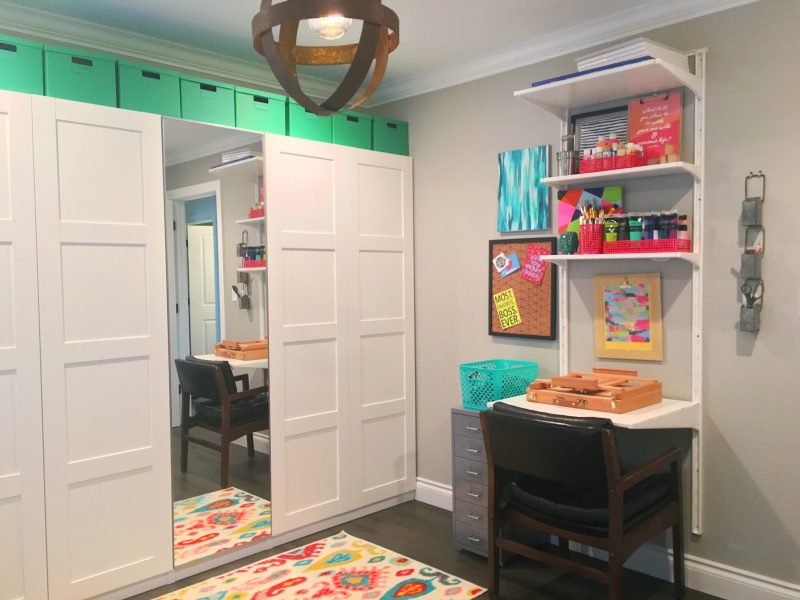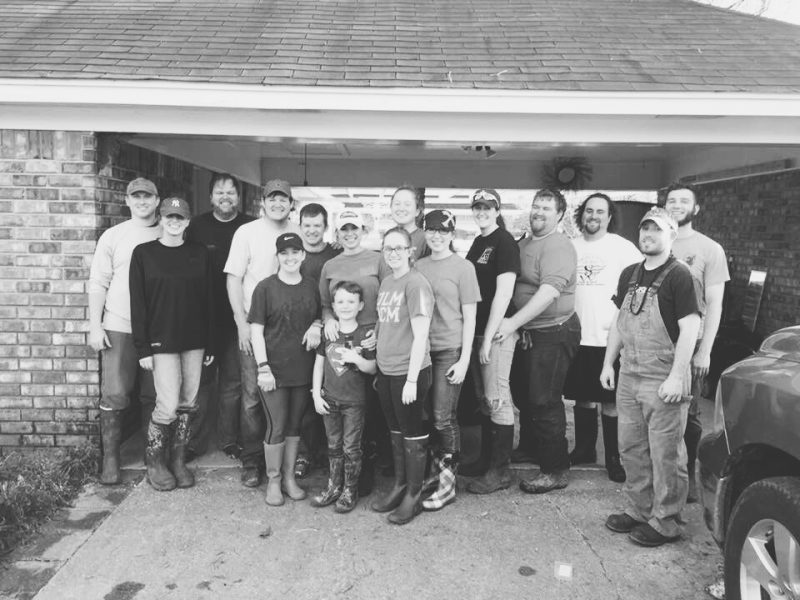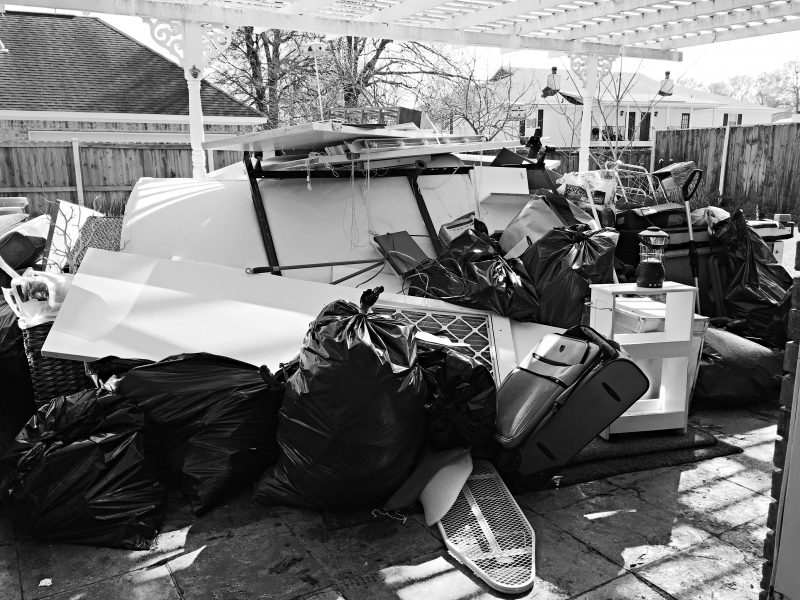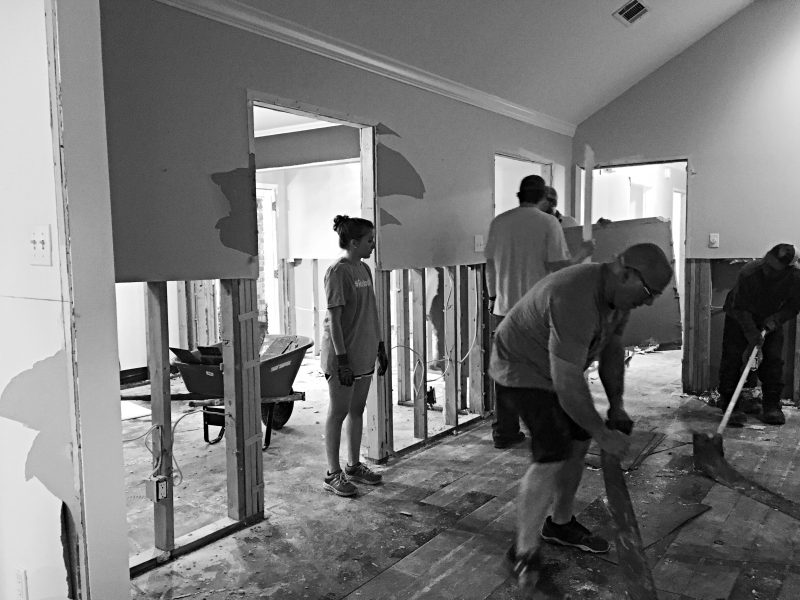 One of Keller William’s most fundamental courses is called BOLD. In this program, a BOLD coach flies in from across the country and leads you through the course’s material while often interjecting a bit about their own lives. This course isn’t really a real estate course. Actually, only about 10% of the material is real estate specific and the rest is entirely about mindset.
One of Keller William’s most fundamental courses is called BOLD. In this program, a BOLD coach flies in from across the country and leads you through the course’s material while often interjecting a bit about their own lives. This course isn’t really a real estate course. Actually, only about 10% of the material is real estate specific and the rest is entirely about mindset.
Tag Archives: What I’ve Learned
A Simple Way to Get More Time
My Audience. My Tribe.
 I attended a webinar held by Emily P. Freeman on writing to better serve your audience. I didn’t really know what to expect from the webinar. I had simply received an email and signed up, reserving some personal time for myself on Thursday night. Out of nowhere and completely unexpectedly, this webinar might have been life changing.
I attended a webinar held by Emily P. Freeman on writing to better serve your audience. I didn’t really know what to expect from the webinar. I had simply received an email and signed up, reserving some personal time for myself on Thursday night. Out of nowhere and completely unexpectedly, this webinar might have been life changing.
Blow Up Your TV. Throw Away Your Paper.
 I sat there sipping my coffee, still reeling a bit from the hatred I saw the night before. I have a tinge of a headache and I’ve debated what might have caused this one. I’ve engaged in some intelligent dialog already this morning, which restores a bit of my faith in humanity. I’m listening to John Prine’s Spanish Pipedream (video below) for the first time and considering it as a political statement of sorts.
I sat there sipping my coffee, still reeling a bit from the hatred I saw the night before. I have a tinge of a headache and I’ve debated what might have caused this one. I’ve engaged in some intelligent dialog already this morning, which restores a bit of my faith in humanity. I’m listening to John Prine’s Spanish Pipedream (video below) for the first time and considering it as a political statement of sorts.
One Little Word – 2017 Edition
2016 Year in Review

 What a year. If you would have told me last December that this year would have included the many outrageous things that it did, I wouldn’t have believed you. I embarked upon 2016 with big dreams and big ideas as to what the year would look like. I was overjoyed about turning 30 and I even claimed that this would be my year. I think that naiveness goes to show just how unpredictable life can be and that we should always be careful what we ask for. While standing here at the end of 2016 does leave me in a happy, wonderful place, the journey to get here was less than ideal. I learned so much about life this year and I can honestly say the trajectory of my life and my perspective have been changed forever. Let’s look back at this year together. Continue reading
What a year. If you would have told me last December that this year would have included the many outrageous things that it did, I wouldn’t have believed you. I embarked upon 2016 with big dreams and big ideas as to what the year would look like. I was overjoyed about turning 30 and I even claimed that this would be my year. I think that naiveness goes to show just how unpredictable life can be and that we should always be careful what we ask for. While standing here at the end of 2016 does leave me in a happy, wonderful place, the journey to get here was less than ideal. I learned so much about life this year and I can honestly say the trajectory of my life and my perspective have been changed forever. Let’s look back at this year together. Continue reading
Create More Than You Consume
 This phrase has made its way around the internet the last few years. It’s on journals, sketchpads, bags, and tshirts. It’s in Instagram photos galore. “Makers Gonna Make” and other similar phrases have taken hold and passed all around, in theory inspiring makers and creators to spend time working on their crafts. To spend more time actually making something than you do scrolling Pinterest.
This phrase has made its way around the internet the last few years. It’s on journals, sketchpads, bags, and tshirts. It’s in Instagram photos galore. “Makers Gonna Make” and other similar phrases have taken hold and passed all around, in theory inspiring makers and creators to spend time working on their crafts. To spend more time actually making something than you do scrolling Pinterest.
I’ve thought about this saying – create more than you consume – multiple times. In my head, I rationalize things to myself by saying that I don’t have time to create. Besides, what is “consuming” anyway? Is listening to a podcast as I walk consuming? Should I be using that time to make a podcast instead? I’ve toyed with what this really means many times in my head, often justifying to myself that I don’t have a consumption problem and I make plenty.
While sitting on a train heading from Washington back to Oregon, I was listening to a podcast and it provoked thoughts of this very phrase. While staring out at beautiful, lush forests and expansive views of water, I felt compelled to write. Thoughts and stories fluttered though my head, beckoning to be written. I knew that if I didn’t go back to my laptop and get these notes down on “paper,” they’d be gone by the time I tried to write them later. Nonetheless, I just wanted to sit and listen to my podcast aimlessly. That’s the precise moment that I understood this lofty statement – create more than you consume. By continuing to just listen, even when I felt inspired to make, I was consuming instead of creating. Falsely convincing myself that I’d remember these thoughts when the podcast was over, was me enabling myself to keep listening. Here are the facts:
Creating is much, much harder than consuming.
Creating requires effort.
Creating sometimes requires struggle.
Consuming, on the other hand, is easy.
Consuming requires little effort.
And most importantly, consuming can leave us with more inspiration than we know what to do with, resulting in stagnation of ideas and lack of productivity.
Finally, I understood the magnitude of this mantra. We consume more than we create because it’s easier. There’s less risk. And although we don’t have to be churning out 1,000 paintings a day or writing more books than we read, we should make time to be sure that we, too, are putting our work out into the world. When inspiration strikes, we should stop immediately and go explore that spot. Liz Gilbert says ideas are fleeting. They only stay with us a short while and if not put to use, they’ll travel on to someone else.
Finally seeing this saying as more than just something to repin or put on a tshirt, I paused my podcast and wrote those posts. I stopped consuming for a minute in order to create something, even though continuing to listen aimlessly would have been easier.
Most likely we’re all faced with the create vs. consume crossroads more than what we realize. And what if we broadened the spectrum a bit? What if instead of always being the person to receive lovely notes from friends, you were the one to send a note – creating kindness and friendship? What if rather than always being invited to lunch by a coworker, you invited someone to lunch with you – creating relationships? If we broaden the scope of this mantra outside of just the artistic world, we can pretty easily see ways in which we consume more than we create. I wonder what it would be like if we created more in all areas of our lives. What if we created more art? Created more relationships? Created more kindness? More opportunities? More love?
When faced with the opportunity to create or to consume, I think we should remember – consuming in the easy road. Creating is the road less traveled. Which one will you take?
(P.S. Above photo is of my closet/craft room. You can see more on the quick home tour!)
An Addiction to Achievement
 They say the first step is admitting you have a problem. And there could be all sorts of problems – addiction, greed, poor eating habits – you name it. Yet those aren’t what I have to share today.
They say the first step is admitting you have a problem. And there could be all sorts of problems – addiction, greed, poor eating habits – you name it. Yet those aren’t what I have to share today.
Instead of your most frequently diagnosed “problems,” my problem is with achievement. And I’m willing to admit that it, too, is an addiction. Since I can remember, I’ve been an over-achiever. Type A. Perfectionist. A real go-getter. Work horse. You can call it whatever you’d like. The fact of the matter is, I’ve used hard work to mask my own insecurities and as a marker of my value. I’ve placed my self-worth on how hard I work and what various accomplishments I reach.
Don’t be confused. I am a firm believer in a strong work ethic and setting challenging goals. I love goals. Have all the goals. It’s important to make note of the line in the sand though. Work ethic and goals are one thing, positive things even. Using those things to justify your worth, however, is not.
I’ve talked briefly about the glorification of “busy” before, and since then I’ve focused on removing that word from my vocabulary. I don’t want to be busy. I don’t want to compete for the trophy of being the most tired, ragged, and worn out. Being “busy” isn’t cool anymore. Early on in Present over Perfect, the writer talks about a group of friends who help each other take a simpler approach and focus on self-care. She says, “Instead of competing for who’s busier or who’s more tired, who’s keeping more balls in the air, we’re constantly looking for ways to help each other’s lives get lighter, easier to carry, closer to the heart of what we love, less clogged with expectations and unnecessary tasks.” I want these friends. Honestly, I need these friends. I’m not sure that I know where to start on my own.
I’ve been struggling with the realization that my worth is tied to my work lately, and quite frankly, I’ve been trying to ignore it. No one, not even me as a personal growth junkie wants to dig that deep and challenge their very core. Repress, repress has been the name of my game here. Don’t pay any attention to that little voice telling you to reevaluate things and it won’t become real. As I began to read the first few pages of Present over Perfect, I could not focus over the sound of my own mind screaming, “That’s me! That’s me!” The author talks about feeling exhausted and her dreams involving nights alone in complete silence with nothing to do. And sleep. Ah, the thought of a good night’s sleep and feeling rested…preach it, sister!
As I flipped through the first few pages, I knew I wasn’t hiding from this notion of self-care any longer. It was finally time to take stock and identify a better, more compassionate (to myself) way of living. There is an immediate problem though – even though I penciled in “self-care” as a goal for October, I don’t truly understand the concept. I’ve never practiced this approach and the very ideal makes me feel anxious. My approach with myself has been more like that of a pissed off drill sergeant. “Work harder! Do more! You can’t stop yet! Toughen up!” are the types of things I’d say to myself quietly and sometimes even aloud. “Get your shit together,” has often been my motto.
To begin to think seriously about how I talk to and treat myself scares me. Thinking seriously about self-care feels overwhelming. The concept is so foreign and I hardly know where to begin. I’m tempted to smack myself around a bit and give myself a stern talking to, just for “wasting time” on these thoughts. Nonetheless, my rational mind tells me that I’m deflecting and avoiding emotion and that I need to explore this more. What am I hiding from? What emotions and insecurities or fears am I masking by always working harder? Why when I’m not working do I feel like I should be doing something for someone else? Why do I feel undeserving of rest and personal care? I’m not sure what the answers to these questions are yet, and I know it won’t be an easy process to discover them.
“Richard Rohr says the skills that take you through the first half of your life are entirely unhelpful for the second half. To press the point a little bit: those skills I developed that supposedly served me well for the first half, as I inspect them a little more closely, didn’t actually serve me at all. They made me responsible and capable and really, really tired. They made me productive and practical, and inch by inch, year by year, they moved me further and further from the warm, whimsical person I used to be….and I missed her.” – Shauna Niequist, Present over Perfect
I would never classify myself as “whimsical,” and truthfully not particularly “warm” either. However, I can say with certainty that I can relate to this statement. The skills I’ve mastered thus far have been skills that helped me excel in academics and in my career, and much like the author mentions, they’ve also prevented me from resting and taking care of myself both mentally and physically. While I hope I’m not at the midpoint of my life as she references, I can easily see how the skills I’ve developed thus far are not serving me well either. Coming to this realization before my midlife point doesn’t really surprise me – I’ve always been “mature for my age,” another example of my tendency toward over-achievement. Is it possible to take stock of your life and methods at the young age of 30? I think so. Actually, I know so, because as these words leap from her pages, slapping me in the face with reality, I know that I must begin identifying what skills will serve me going forward and do away with many of the ones I’ve mastered so far.
To (hopefully) be continued….
When to Buy Expensive & When to Go Cheap
 This post is basically when to be fancy and when to be basic. Keep in mind, these are my thoughts and what I use for myself, so you definitely don’t have to agree or even care about my rules. That being said, this post is my tell-all handbook for how I remodeled our home on a budget.
This post is basically when to be fancy and when to be basic. Keep in mind, these are my thoughts and what I use for myself, so you definitely don’t have to agree or even care about my rules. That being said, this post is my tell-all handbook for how I remodeled our home on a budget.
First, a little backstory. Our home flooded and left us with about ¼ of the items we owned and a completely demoed house. We saved the top ½ of the sheetrock, the studs, and the roof – actually, we ended up replacing the roof too. That’s pretty much it. After the initial shock, we were forced to start making all the decisions about rebuilding – basically our lives where a whirlwind of who, what, where, when, and how. (You can read about how that was a nightmare for me here.) Now that construction is finished, I thought I’d share a bit about how I made what decisions and where I chose to splurge versus not.
For this project, we had a budget. We basically had XX number of dollars to rebuild the entire house, do any upgrades we’d been dreaming about, AND replaced all of the personal items we lost. There was simply that number of dollars. We weren’t taking out a second mortgage or selling a car to pay for things. We had to make tough decisions CONSTANTLY about where to splurge and where to save.
An old adage to note here is, “you get what you pay for.” Most of us have heard that since the beginning of time and unfortunately for our pocketbooks, it’s true. We simply don’t get high quality items for pennies. This, of course, doesn’t count the occasional sale or lucky find. And, that being said, you can usually easily tell the difference in how the quality version of something performs compared to the lower quality one. I noticed this immediately with my car. It simply drives and feels different than any other vehicle I’ve ever had. This was a fact that I didn’t understand until I drove one myself, which was the day I drove it off the lot. Have I mentioned that I love that car?? I digress.
Back to the house. One of the first examples of quality difference that I noticed in the “new” house was the faucets. We chose to put Delta faucets and Kohler sinks throughout the entire house. (Please make a note of this if you’re considering buying my house in the future and you’re doing your research on the property. Upgrades throughout! A lovely place to call home! *wink wink*) Back to the faucets. When I first used the new kitchen faucet, I nearly swung it off the countertop because it swiveled so easily! The last faucet we had was much harder to rotate, and to be honest, I often thought I was going to break it. I was also super impressed with the new pull down sprayer. When I released it from spraying out the sink, it just popped right back into place and looked as beautiful as ever! After the first use on the last faucet, I felt like it never fit back together properly and you always had to force it back into place. It was better that what we had previously, though this Delta faucet makes the old one feel like an ugly stepchild. (No offense, ugly step children.) Expensive definitely doesn’t always equal quality. However, in most cases, the “pay for what you get” rule does apply.
 So, how does one know where to upgrade and where to not? I’m glad you asked. I feel like sort of an expert on this topic because I’ve always applied these principles in most areas of my life and used them daily lately. My wardrobe, for example, is a compilation of quality where necessary and inexpensive where people won’t notice. When it comes to the house, we splurged on some items like the faucets and I won’t splurge on other things like door mats or paper towel holders. I’ll wait until I find adorable options at a discount store like TJ Maxx or Ross. (So, stay out of those stores until I find all of the cute, cheap items that I need. Then you can return to your normal shopping pleasure.) Here are a few rules I applied to splurging on our house renovation that I’ve used over and over again in other areas too:
So, how does one know where to upgrade and where to not? I’m glad you asked. I feel like sort of an expert on this topic because I’ve always applied these principles in most areas of my life and used them daily lately. My wardrobe, for example, is a compilation of quality where necessary and inexpensive where people won’t notice. When it comes to the house, we splurged on some items like the faucets and I won’t splurge on other things like door mats or paper towel holders. I’ll wait until I find adorable options at a discount store like TJ Maxx or Ross. (So, stay out of those stores until I find all of the cute, cheap items that I need. Then you can return to your normal shopping pleasure.) Here are a few rules I applied to splurging on our house renovation that I’ve used over and over again in other areas too:
- Splurge on items that you use often. An example here would be the faucets. They’re touched and turned on and off every single day. Delta faucets even come with a lifetime warranty so if something goes wrong, you just call them. You don’t get that with cheaper brands. I also applied this principle to our bed which I’ll never, ever regret. We could have gotten a cheaper mattress. However, you spend almost half of your life in bed. That should definitely be an area to splurge. (If you need a suggestion for someone to talk to here locally, let me know!) A third example here is the washer and dryer. Even for just the two of us, I do a LOT of laundry. And I’m very, very particular about my clothes. (Ask my friends. “Yes, you may borrow this. Don’t mess it up and bring it back to me dirty so that I can wash it myself” is basically how those conversations always went.) By investing in a nice, larger washer/dryer, I have more options for caring for our clothes AND I’ve cut my laundry time in half by being able to do larger loads.
- Splurge on items that will otherwise deteriorate quickly. The first example that comes to mind here is towels. Sure, you can buy cheap towels at the dollar store. However, it’s important to think about how long they’ll last. Towels certainly fall into the first category too, because ideally (hopefully) you use them every day. While I’m not ordering imported, fancy towels from wherever you import fancy towels from, I certainly won’t buy the cheapest version. This way, the bath experience feels a tad more luxurious and the product will last longer. If you have to repeatedly replace the cheaper version of something, you’re likely spending more money and having more headaches than if you’d have just upgraded a bit in the first place.
- Splurge on items that you LOVE. Clearly, we can’t splurge on everything we love. If so, I’d basically own Anthropolgie. However, sometimes you come across something that speaks to you, even though it might cost a little more than a similar version. Most of the time when this happens, it’s probably something you’ll use repeatedly for years to come. For example, Matthew and I found a rug that we both liked and it was neutral enough and high enough quality that we knew we’d use it for years to come, even if it was in a different room later. We decided to spend a little extra there because based on the years we’d use it, the cost was completely justified. Get this though – when he got to the checkout counter, it was 50% off!! We didn’t even know it was on sale when we made the decision to purchase. *Insert 1,000 dancing emojis.*
- Splurge when the process of trying NOT to splurge is more trouble than it’s worth. This is a big one for me. If you’re not naturally anxious like me, you can probably skip this one. To be honest, this rule has only become part of my splurge versus not conversation since I married my super chill husband. One day when complaining about how I just couldn’t find an affordable version of *insert random object here,* he asked if I’d wasted enough time already looking for a deal that I could have just bought the original version. It was a light bulb moment for me. Time is definitely worth something and I might be sacrificing way too much of my time to save just $5, $10, or $20. Now, I try to ask myself – could the time I spend looking for a “deal” actually be costing me time. Could the time I’m using be used in a more productive or profitable way? If I realize that the answer is yes – it’d be better to spend $10 extra dollars here than driving across town, spending time and gas, then I “splurge.”
 Now, where should you not splurge? These “rules” will vary greatly depending on what’s important to you. If you’re passionate about soap dishes or kitchen sponges, then so be it. I’m just not, so these tips are based on my personal preferences. In a nutshell, I feel like you should generally avoid splurging on the less noticeable things. However, here are some more specifics:
Now, where should you not splurge? These “rules” will vary greatly depending on what’s important to you. If you’re passionate about soap dishes or kitchen sponges, then so be it. I’m just not, so these tips are based on my personal preferences. In a nutshell, I feel like you should generally avoid splurging on the less noticeable things. However, here are some more specifics:
- Do not splurge on trendy items. We’ve all seen it. One day everyone is raving about mesh wreaths and the next it’s wall weavings. Trends ebb and flow constantly. My general rule of thumb is to never, ever splurge on something too trendy. If it happens to fall into #3 above, then maaaybe. However, if you go all out on something too trendy and the trends change, your home is going to look dated instantly. You need to be able to practice “out with the old and in with the new” in regards to trends and if you’ve mortgaged the house on that item, it’s going to be a lot harder to do. Actually, while we’re at it, I generally try to avoid anything that’s gone mass trendy anyway. If everyone you know is using it/wearing it/has it, it’s probably going to be lame in a matter of minutes. If you struggle with picking what’s classic and cool (and not overly trendy), watch your artsy friends. They’ll be doing trends before they’re cool and then likely abandon them once they’re widespread. The moral of this story is to not splurge on trends. And to avoid gangbuster trends altogether (if you wanna be supa fly, that is).
- Do not splurge on the small stuff. I’ll use the paper towel holder as an example again. There is most likely a marble or handmade stone paper towel holder out there that is breathtakingly beautiful. And most likely, I’d love to have it. However, I’ve never hosted a party and had guest ooh and ahh over my paper towel holder. Or the rags that I clean with. Or the front door mat. Or the light switch covers. There are definitely high quality, expensive versions of these things out there and again, if they fall into #3 above, go for it. Chances are though, most people don’t even notice the small stuff. AND most of the time you can find nice, less expensive version of these items either at a discount store or on sale somewhere. I have never paid more than $10 for a door mat and I’m quite proud of that fact. Usually by waiting, you can come across cute versions of these smaller items for less money. It’s how I create balance.
- Do not splurge simply for the sake of splurging. I know some people who simply spend money for what seems like no reason. They buy the expensive versions of everything because they equate dollar signs with value and worth. I do believe that quality comes with higher prices the majority of the time. However, the quality of my light switch covers is just not important to me. If you find yourself splurging on every single thing or spending money just to spend it, you should probably speak to your therapist. And cut up those credit cards.
- Do not splurge on a temporary solution. If you desperately need a dresser to hold your unmentionables and you really, really want that vintage chifferobe that will take you a bit to find, don’t splurge on the temporary solution. Buy something that works alright for now so that you can replace it without hurt feelings and a hurt pocketbook when you find the thing you really want. Similarly, I wouldn’t suggest spending a ton on something that will only work in this one spot in this one house. If you won’t be able to reuse that item, then it probably shouldn’t be a splurge item. My most recent example is our master bedding. I think that it’s important to get your bedroom set up and comfortable ASAP after a move, or remodel in our case. I haven’t chosen my permanent bedding yet, and rather than spending a lot on something temporary, we purchased an Ikea duvet to use in the interim. The room will be “fixed” and functional for now, and when I find my permanent bedding, I won’t have wasted a ton of money on the temporary.
As I said above, these guidelines are just how I personally approach spending money on my home. These tips were fresh on my mind since I’ve been employing them every single day lately, so I thought I’d share with the class. There will sometimes be exceptions (but pay close attention to #3 on what NOT to do) and there will always be differences in budgets and opportunities. You might want to be jealous of my Delta faucets (cause they’re awesome). However, I’ll kindly remind you that I had to go through one of the most traumatic experiences of my life thus far to get those faucets. If I had to spell out the biggest thing for you to take away from this post, it would be this – never spend more money than you have and never, ever compare yourself and your situation to someone else’s. Save where you can and treat yo self sometimes. If you’d like some inspiration on building a lovely home on a budget, this book and her blog is a great resource.
If you have any guidelines that you follow when deciding when to splurge and when not to, I’d love to hear them. Most of us don’t have the luxury (or are responsible enough to not to use it) to simply buy whatever we want, whenever we want it. I’d imagine that we all have strategies that we use, maybe without even noticing it, when making purchasing decision. I’d love to hear your tactics!
How to Help in a Flood (And Other Traumatic Life Events)
 Below is a post I’d started regarding how to handle death/tragedy as an outsider, as a friend or acquaintance of the effected, or as a mere stranger who wants to help. Since sharing my post after the Baton Rouge flooding, I’ve been asked to come up with a list of things others can do to help. I left the original message intact and added this first portion of items that YOU can do to help in a flood or similar tragedy. Browse the list. See what you’re capable of doing. And offer a helping hand. Believe me, there’s no task too small and your good deeds will mean the world to those hurting. After browsing this list, continue to read my original thoughts below. These were written a few months after navigating our own tragedy and offer some insight on what to do AND what not to do.
Below is a post I’d started regarding how to handle death/tragedy as an outsider, as a friend or acquaintance of the effected, or as a mere stranger who wants to help. Since sharing my post after the Baton Rouge flooding, I’ve been asked to come up with a list of things others can do to help. I left the original message intact and added this first portion of items that YOU can do to help in a flood or similar tragedy. Browse the list. See what you’re capable of doing. And offer a helping hand. Believe me, there’s no task too small and your good deeds will mean the world to those hurting. After browsing this list, continue to read my original thoughts below. These were written a few months after navigating our own tragedy and offer some insight on what to do AND what not to do.
How to help:
- Gather tubs/boxes for them to pack in. If there’s items that can be saved, they’ll need something to pack them in. These aren’t usually items that come around on the donation trucks, so pulling together something to pack in could be very helpful.
- Help pack salvageable items. They need to save everything they can. Help them with this process, just be sure NOT to put anything wet into a box.
- Write down damaged items for them. As someone is cleaning out the damaged items, someone needs to make an inventory of what’s tossed for insurance purposes.
- Help with demo. The most obvious way to help is to help with the demolition. Wet furniture and belongings need to be removed. Carpets need to be pulled and sheetrock/baseboards need to be removed. Anything and everything that was touched by water needs to be removed for the house to dry properly. This job can be done by most, not just the strong ones. Carrying out pieces of sheetrock and baseboards isn’t as labor intensive as you might initially think.
- Wash clothing. Some of the wet clothing might be salvageable and even the dry items need to be laundered before packing away or wearing again. This job is great for someone who has to remain at home and isn’t able to do manual labor.
- Run errands. Most likely the effected need medications or toiletries picked up. They may need something taken to the post office, etc. Offer to run these errands for them because they likely need to be at the home or on the phone for now.
- Deliver food. During a major tragedy, there will probably be organizations delivering meals. If not, be sure they have something to eat, especially for lunch while they’re dealing with insurance, etc. After most of the volunteers start pulling out, this is a great way to continue to help.
- Give them somewhere to stay. If they don’t already have somewhere to stay for a few days, offer a room or extra property you have. They’ll need a few days or so to make permanent plans. Hotels are usually in short supply and they often don’t know where to go.
- Help with their business. Their work lives probably don’t stop because they’re facing this experience. If there’s a way you can help – taking care of clients, rescheduling appointments, etc. – do offer that. If they run their own business, they’re likely afraid of things falling apart during the toughest and possibly most financially unstable time of their lives. Do what you can to help them stay on top of work.
- Offer childcare. If they have children or pets, offer to take care of them while they sort through things.
- Give rides or offer up spare vehicles. If cars were flooded too, they’re very much so stranded. This adds to the helplessness and even if they’re allowed a rental via insurance, they’re very tough to come by in a major disaster when everyone else is procuring rentals too.
- Pick up supplies. A lot of cleaning items will be donated by organizations. However, there might be some specific items that are missing. Gloves for volunteers are a good example. Or raincoats if it’s still raining. Think of items that the Red Cross won’t be gathering and offer up those.
- Store items for them. Storage for what was saved is probably also in short supply. If you have extra space, offer that up as a way to help.
- Make suggestions for contractors, etc. They’ll need to make decisions quickly and if they don’t already have a network of home related individuals to pull from, they could use your recommendations.
- Offer opportunities from your network. If you know someone who provides a service or have connections at a place they need help from, pull those strings! We called in every favor we had in town during our time of need. If you have a connection to offer them, they’ll appreciate it.
- Go grocery/supply shopping. Once they’ve found temporary housing, they’ll need help getting it set up. They’ll be starting from scratch here so helping them stock the pantry and house will be helpful. Think salt & pepper, paper plates, bathroom and door rugs, towels, etc. Unless their temporary housing is fully furnished, they probably won’t have any of these items. You can even offer up items for them to borrow. Just be sure to write your name on it. They’re likely to forget what belonged to who amidst the chaos.
- Reach out. At a bare minimum, reach out to them. Tell them you’re thinking about them and that you hate they’re having to face this. Even if you don’t know exactly what to say, saying (and doing) something is better than nothing. If you don’t know where to start, share my previous post with them. Also, see below for things NOT to say.
- Show up. Once the shock wears off and support dies down, they’ll start to see things they need. They need both emotional and physical support. Seeing a friendly face who’s happy to pick up a snack on the way will mean the world to them.
 As Matthew and I experienced this flood together, we lost a lot. Lots of physical items, the safety and comfort of our home, sometimes our sanity and the overall quality of life and our marriage. Since the beginning of the process, I’ve compared this experience to that of losing a loved one. (Please note: if you just lost a loved one, I’m not at all saying that losing my favorite Antonio Melani pumps – along with thousands of other things – is the same as losing a person.) Instead, I’m saying is similar. If you don’t quite understand yet, let me explain further.
As Matthew and I experienced this flood together, we lost a lot. Lots of physical items, the safety and comfort of our home, sometimes our sanity and the overall quality of life and our marriage. Since the beginning of the process, I’ve compared this experience to that of losing a loved one. (Please note: if you just lost a loved one, I’m not at all saying that losing my favorite Antonio Melani pumps – along with thousands of other things – is the same as losing a person.) Instead, I’m saying is similar. If you don’t quite understand yet, let me explain further.
We went through the same stages of grief – denial, anger, bargaining, depression, and acceptance. There were some parts of the process in which we literally had to mourn. For months, we felt a sense of emptiness and incompleteness. Our worlds were shaken and turned upside down unexpectedly, and that simple fact left us in a state of chaos and grief for a long time.
 Over a year ago I came across this post about how to write a sympathy card and parts of that article have stuck with me since. Just recently I came across it again and was reminded of its good tips and point of view. I could also relate all of those back to this flood experience and thought this would be a good opportunity to share that post about sympathy and offer some suggestions on how to help a friend in need when you really don’t know what to do (as well as, a few suggestions on things to steer away from).
Over a year ago I came across this post about how to write a sympathy card and parts of that article have stuck with me since. Just recently I came across it again and was reminded of its good tips and point of view. I could also relate all of those back to this flood experience and thought this would be a good opportunity to share that post about sympathy and offer some suggestions on how to help a friend in need when you really don’t know what to do (as well as, a few suggestions on things to steer away from).
Let’s start with what TO do:
- Do something. This might seem obvious and yet it isn’t. Often times, we don’t know what to do to help in a time of loss or tragedy. It doesn’t mean that we don’t care – we just don’t know what the person needs. However, what will stand out to your friend is that you did something. We received many of the “if I can do anything, please let me know” messages, and we did appreciate the thoughts. The problem is, in a time of chaos and uncertainty, you really don’t know what you need. If you want to be there for your friend, just show up and do something. For us, we had people just show up to help us pack up what we could save and throw out the majority. They just showed up and it was the most comforting thing ever. We didn’t have to think, plan, or ask. They were just there. My suggestion to anyone wanting to comfort a loved one is to just so something. It doesn’t have to be anything huge. Show up with an icee, give them a hug, or just show your face so they can identify you as someone who cares. Bring take out, offer a night away from the craziness a few weeks/months later, bake cookies, run an errand for them…even the smallest of deeds will speak volumes to your friends. I promise. One of the main things that I’ll take away from this gruesome experience is that though we mean well saying “let me know what I can do to help,” they don’t know what they need. Just do something.
- Do realize that the pain and chaos doesn’t end that day or that week. Whether it be death or tragedy, it will affect your friends for months or years. The pain and heartache doesn’t go away after everyone else has returned to their normal lives. From experience, I know that it will mean the world to your friend if you check on them weeks or months later. After the initial shock dies down, most people return to back normal life and the effected is left still trying to figure things out alone. I remember the day the madness died down here. We’d been surrounded by friends and family helping. One day we woke up and the city had gone back to work. Friends weren’t here, volunteer crews had pulled out, churches were no longer delivering food, and it was the loneliest feeling you can imagine. Of course, we never expected to have support forever. The point I’m making here is that if you don’t know how else to help someone in need, watch for the new to wear off for everyone else. Watch for family to return home and people to stop talking about what happened. There’s a good chance that your friend is just now facing the reality of what happened and they could probably use a loving face to remind them that they’re not alone. Again, no one expects you to be a knight in shining armor and make the pain go away. Most of the time, just showing up and listening if they want to talk or unload is usually enough.
 Now let’s talk about a few things NOT to do that might seem harmless at first glance:
Now let’s talk about a few things NOT to do that might seem harmless at first glance:
- Do NOT try to trump their story. So often during the process we got responses like “my aunt’s second cousin twice removed had 6 feet of water in her house.” Or even worse, “I know what you mean, my hydrangeas got so much water they’ll probably never bloom again.” Most of the time, people are just trying to make a connection and find common ground. However, telling someone that you know a story that’s worse than theirs can be a little insulting. And in the case of that second example, it might make them want to punch you in the face. In this situation, it’s definitely ok to share a similar story or show that you understand…just don’t belittle what’s happening to the person in front of you. The same thing often happens with death. Do your best to relate to the person without stealing the show. I often encounter this when a friend losses a loved one. I’ve had my fair share of experience with death so I definitely understand all of the emotions they’re feeling. However, this isn’t a time for me to tell my story of loss…it’s a time for them to tell theirs. My suggestion is to simply say, “I understand…I lost my dad to cancer too. It really sucks. Can I bring you a pizza tonight?” Leave it at that. Or, “Yes, I saw the crazy flooding and helped some friends move out. I have some extra towels you can borrow. Do you need those right now?” So many times during this flood, people would launch into stories they’d simply heard about people they hardly knew and while I always knew they were just trying to connect, it felt like they were competing with my story. And whether someone got two inches of water or twelve in their homes, I can promise it still rocked their world. It’s not a competition. We’re not trying to win. We all just want to survive.
- Do NOT say everything happens for a reason. Whether you believe this as truth or not, no one wants to hear that they just lost everything “for a reason.” When you’re in the throes of despair, the “reason” doesn’t matter. Whether you learn a lesson, become a better person, or end up better off in the end, the reason simply doesn’t matter when you’re hurting. Whether it’s a breakup, a death, or they’ve just fallen on hard times, don’t tell them it’s for a reason. Instead, tell them that they’ll make it through because they’re strong. Tell them that you hate they’re having to go through this. Tell them specifically how you can help (see #1). And then just listen.
- Do NOT ask “were they sick” or “did you have insurance.” It’s natural to sometimes let curiosity get the best of us. We want to know things and to understand. Even as outsider, we sometimes need to feel some closure and feel better because there was some preparation involved. However, regardless of whether their loved one was sick, or in our case if we had food insurance, the situation still sucks. Dismissing their struggle because they had insurance or knew it was coming, is very insensitive. In our case, most of the conversations happened like this: “aw, you flooded? That sucks. Did you have food insurance? Yes? Ok, bye.” I cannot even tell you how many times my feelings were hurt when people minimized what we were going through, simply because we had some insurance. Yes, that’s a relieving fact and something I’ll forever be grateful for. We still had to go through hell (and high water, ha) and I often felt disregarded simply because our story wasn’t as tragic as some others. Again, regardless of the topic, there’s someone’s story that’s always worse.
 These few dos and don’ts are just suggestions based on my own experience and feelings. The second half of this post was drafed shortly after making sense of my own reality. We identified who showed up and who didn’t. We were met with a lot of unintended insults and could clearly see situations in which we, too, had committed these unintentional faux pas or should have done more to help someone. Gathering this list of “tips” helped me to process my own feelings on the topic and realize how I’d like to approach these situations going forward. Going forward, I won’t ask someone hurting to think of what I can do to help. Instead, I’ll offer specific things that I can do. And I’ll just show up. If anything, this experience has taught me how to be a better friend or a better stranger to those in need.
These few dos and don’ts are just suggestions based on my own experience and feelings. The second half of this post was drafed shortly after making sense of my own reality. We identified who showed up and who didn’t. We were met with a lot of unintended insults and could clearly see situations in which we, too, had committed these unintentional faux pas or should have done more to help someone. Gathering this list of “tips” helped me to process my own feelings on the topic and realize how I’d like to approach these situations going forward. Going forward, I won’t ask someone hurting to think of what I can do to help. Instead, I’ll offer specific things that I can do. And I’ll just show up. If anything, this experience has taught me how to be a better friend or a better stranger to those in need.
If you have learned other things from similar experiences, please leave a comment! I think we’d all like to be better friends and to know what to do when tragedy strikes with or without warning. Please share your thoughts! And please reach out and encourage those who are still struggling!


